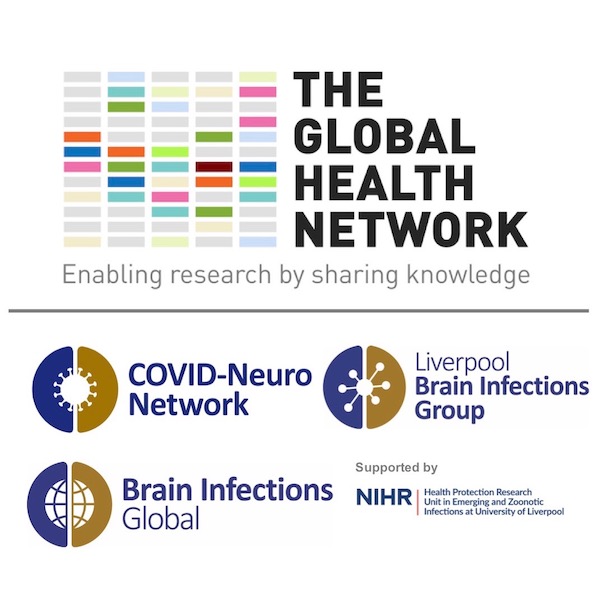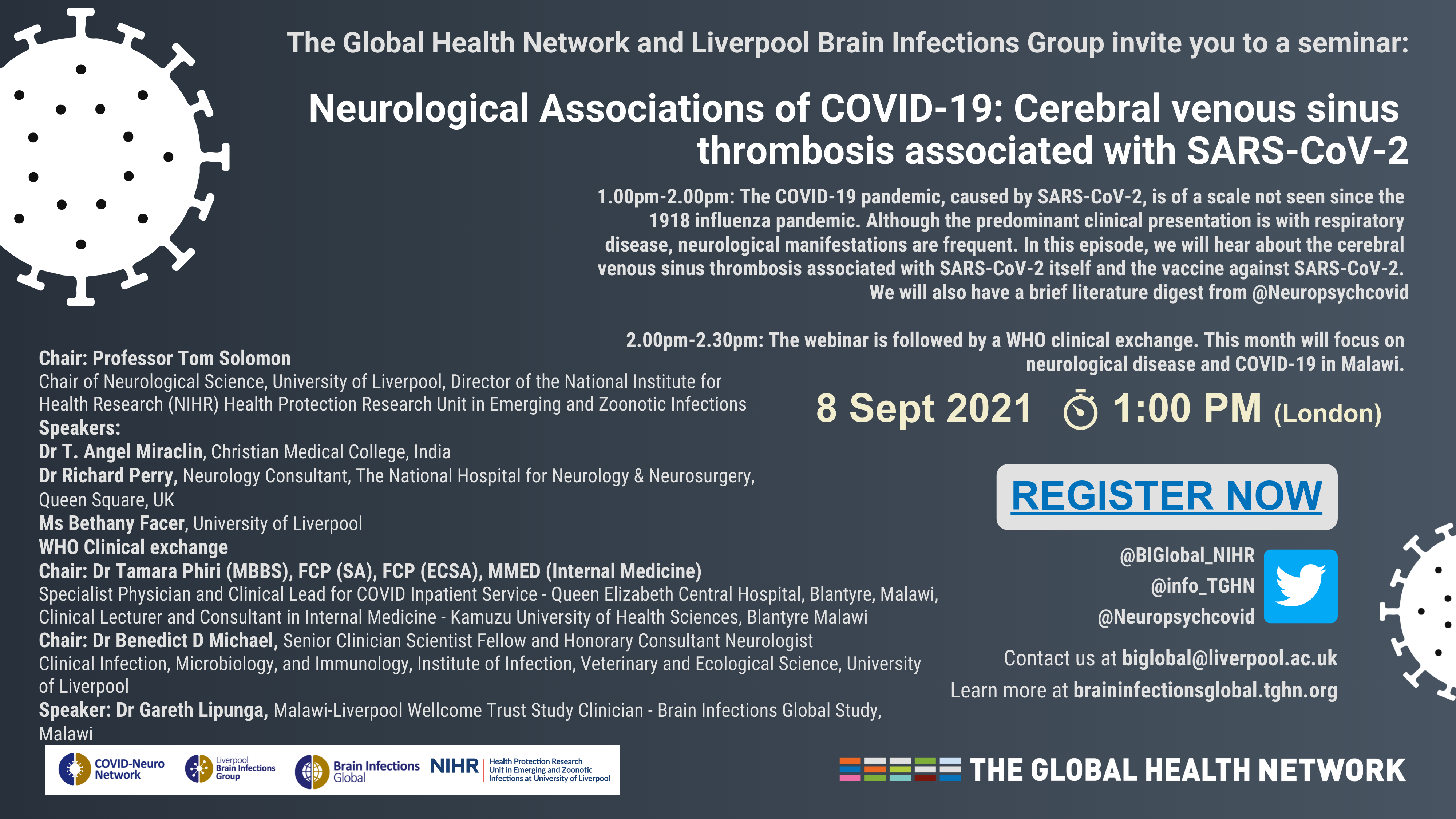The COVID-19 pandemic, caused by SARS-CoV-2, is of a scale not seen since the 1918 influenza pandemic. Although the predominant clinical presentation is with respiratory disease, neurological manifestations are being recognised increasingly. This webinar, held on 1 May 2020, reviewed what’s known about neurological manifestations of SARS CoV-2 and related coronaviruses, consider the disease mechanisms and outline a framework for future investigative studies.
Chair: Prof Tom Solomon

Prof Leonardo Pantoni: On being a neurologist in Italy at the time of the COVID-19 outbreak
Dr Laura Benjamin: The emerging layers of complexity in managing stroke patients with SARS-CoV-2 infection
Dr Avindra Nath: Disease mechanism of COVID-19 in neurological patients
Prof Tom Solomon is Director of the National Institute for Health Research Health Protection Research Unit in Emerging and Zoonotic Infections, head of the Brain Infections Group, Professor of Neurological Science, and Honorary Consultant Neurologist, Walton Centre NHS Foundation Trust and Royal Liverpool University Hospital. He studied medicine at Wadham College, Oxford, before undertaking a PhD on central nervous system infections in Vietnam, with a Wellcome Trust Advanced Training Fellowship. He then became a Clinical Lecturer in Neurology, Medical Microbiology and Tropical Medicine at the University of Liverpool,and was awarded a Wellcome Trust Career Development Fellowship. This included two years as a visiting scientist at the University of Texas Medical Branch, Galveston, Texas. He was made a Senior Lecturer in Neurology in Liverpool in 2005, and awarded a Medical Research Council Senior Clinical Fellowship the same year. He became Chair of Neurological Science in 2007, and was Director of the newly formed Institute of Infection and Global Health in 2010-2017. His research focuses on emerging infections, particularly those that affect the brain. He heads the Liverpool Brain Infections Group, which works to reduce the burden of neurological disease in the United Kingdom and globally, through research, training and capacity building, and public engagement.
Dr Laura Benjamin is a Senior Clinical Fellow at The Stroke Research Centre, University College London’s (UCL) Queen Square, Institute of Neurology. She trained as a neurology physician at the Walton Centre (Liverpool) and The National Hospital for Neurology and Neurosurgery (London). She obtained a PhD at The University of Liverpool with the Brain Infections Group, where she examined the epidemiology of HIV infection and stroke in Malawi. Her most recent work is focused around the mechanisms of HIV-Stroke, where she is developing a translational pathway, from understanding the cellular biology between HIV infection and the vascular endothelium in an in-vitro model, to developing a HIV clinical cohort phenotyped for cardiovascular disease. She’s the co-Principal investigator of a longitudinal cohort of HIV positive patients (800+) starting anti-retroviral therapy in Malawi, and she is leading the set-up of a multidisciplinary-driven project between UK partners and Malawi partners in setting up Malawi’s first stroke unit. The group aspires to provide evidence-based, resource sensitive stroke care to poor populations.
Prof Leonardo Pantoni is Professor in Neurology at the Department of Biomedical and Clinical Sciences "L. Sacco", University of Milan, Italy. He has vast experience in managing (emergency) patients with neurological pathologies such as stroke, cerebrovascular disease, dementia, degenerative brain disease, headache and others. He is a board member, councillor and director on various national and international societies, and has been involved in developing guidelines on vascular cognitive impairment, dementia, brain imaging, stroke and others. His research focuses on stroke and he was also Deputy Coordinator of the European Union funded Leukoaraiosis and Disability Study (LADIS).
Dr Avindra Nath received his MD degree from Christian Medical College in India in 1981 and completed a residency in Neurology from University of Texas Health Science Center in Houston, followed by a fellowship in Multiple Sclerosis and Neurovirology at the same institution and then a fellowship in Neuro-AIDS at NINDS. He held faculty positions at the University of Manitoba (1990-97) and the University of Kentucky (1997-02). In 2002, he joined Johns Hopkins University as Professor of Neurology and Director of the Division of Neuroimmunology and Neurological Infections. He joined NIH in 2011 as the Clinical Director of NINDS, the Director of the Translational Neuroscience Center and Chief of the Section of Infections of the Nervous System. His research focuses on understanding the pathophysiology of retroviral infections of the nervous system and the development of new diagnostic and therapeutic approaches for these diseases.
Find out more about the COVID-19 Neuro Network
The COVID-19 pandemic, caused by SARS-CoV-2, is of a scale not seen since the 1918 influenza pandemic. Although the predominant clinical presentation is with respiratory disease, neurological manifestations are being recognised increasingly. In this episode, we will discuss what we can learn from the literature on neurological manifestations of COVID-19 and 'mutant' responses to COVID-19.
September 10, 2020 13:00 PM (GMT+1:00 London)
Register now
Chair: Prof Tom Solomon
Prof Elizabeta Mukaetova-Ladinska:'Mutant' responses to Covid-19
Prof. Kameshwar Prasad:Neurological manifestations of Covid: what can we learn from the literature?
Prof Tom Solomon Prof Tom Solomon is Director of the National Institute for Health Research Health Protection Research Unit in Emerging and Zoonotic Infections, Head of the Brain Infections Group, Professor of Neurological Science, and Honorary Consultant Neurologist, Walton Centre NHS Foundation Trust and Royal Liverpool University Hospital.
Prof Elizabeta Mukaetova-Ladinska is a Professor in Old Age Psychiatry (University of Leicester) and an honorary Consultant in Old Age Psychiatry (Leicestershire Partnership NHS Trust, Leicester, UK). Her research focuses on blood biomarkers for dementia, neurofeedback treatment to prevent and treat early dementias, and characterisation of molecular substrates underlying dementia. She is also involved in establishing a dementia research specifically targeting the BAME population in East Midlands in the UK, and defining the role of Artificial Intelligence (AI) art in care of an ageing society.
Prof. Kameshwar Prasad is a professor of neurology at the All India Institute of Medical Sciences (AIIMS), New Delhi. He trained in Medicine and Neurology at AIIMS and continued as a faculty. He has also obtained an MSc in Clinical Epidemiology and Health Research Methodology, McMaster University, Canada. He has more than 37 years of experience in neurology practice, education and research, and has published more than 320 papers in peer-reviewed journals. His areas of research interest include Neuro-infections, Stroke, Evidence-Based Medicine, Clinical Trials, and Meta-Analysis, Medical Education, & Clinical Epidemiology. He is currently the PI of a large population-based cohort of middle-aged and older adults in and near Delhi. He is a contributing Editor of the Cochrane Stroke Group and is a member of the International Editorial Advisory Board of BMJ. He is a fellow of National Academy of Medical Sciences.
Find out more about the COVID-19 Neuro Network
Neurological Associations of COVID-19: Cerebral venous sinus thrombosis associated with SARS-CoV-2
The COVID-19 pandemic, caused by SARS-CoV-2, is of a scale not seen since the 1918 influenza pandemic. Although the predominant clinical presentation is with respiratory disease, neurological manifestations are frequent. In this episode, we will hear about the cerebral venous sinus thrombosis associated with SARS-CoV-2 itself and the vaccine against SARS-CoV-2. We will also have a brief literature digest from @Neuropsychcovid.
The webinar is followed by a WHO Clinical Exchange. This month will focus on neurological disease and COVID-19 in Malawi.
Chair: Professor Tom Solomon
Chair of Neurological Science, University of Liverpool, Director of the National Institute for Health Research (NIHR) Health Protection Research Unit in Emerging and Zoonotic Infections
WHO Clinical Exchange
Chair: Dr Tamara Phiri (MBBS), FCP (SA), FCP (ECSA, MMED (Internal Medicine) Specialist Physician and Clinical Lead for COVID Inpatient Service - Queen Elizabeth Central Hospital, Blantyre, Malawi, Clinical Lecturer and Consultant in Internal Medicine - Kamuzu University of Health Sciences, Blantyre Malawi
Co-chair: Dr Benedict D Michael Senior Clinician Scientist Fellow and Honorary Consultant Neurologist Clinical Infection, Microbiology, and Immunology, Institute of Infection, Veterinary and Ecological Science, University of Liverpool
Speaker: Dr Gareth Lipunga Malawi-Liverpool Wellcome Trust
Study Clinician- Brain Infections Global Study, Malawi
September 8 13:00-14:30 (UK time)

